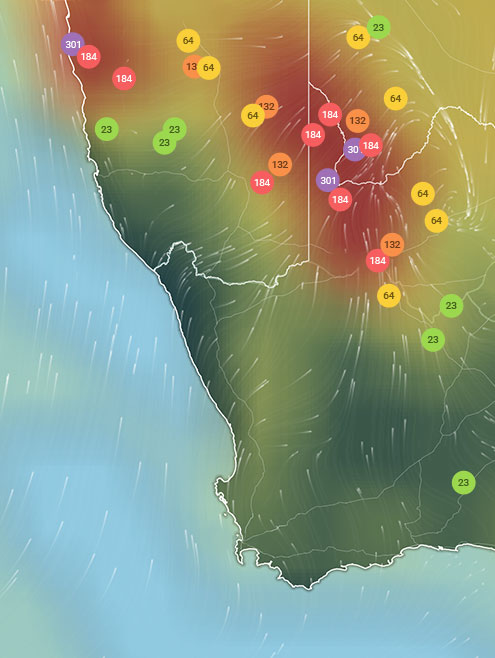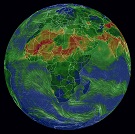Get a monitor and contributor to air quality data in your city.
17K people follow this city






AIR QUALITY DATA CONTRIBUTORS
Find out more about contributors and data sources| Weather | Clear sky |
| Temperature | 100.4°F |
| Humidity | 30% |
| Wind | 12.7 mp/h |
| Pressure | 29.7 Hg |
| # | city | US AQI |
|---|---|---|
| 1 | Chiang Mai, Chiang Mai | 160 |
| 2 | San Sai, Chiang Mai | 157 |
| 3 | Doi Saket, Chiang Mai | 156 |
| 4 | Mae On, Chiang Mai | 155 |
| 5 | Mae Mo, Lampang | 153 |
| 6 | Sam Phran, Nakhon Pathom | 152 |
| 7 | Chiang Rai, Chiang Rai | 143 |
| 8 | Uttaradit, Uttaradit | 137 |
| 9 | Hua Hin, Prachuap Khiri Khan | 122 |
| 10 | Cha-am, Phetchaburi | 109 |
(local time)
SEE WORLD AQI RANKING
| # | station | US AQI |
|---|---|---|
| 1 | Mukdahan Provincial Stadium | 130 |
| 2 | Mukdahan Provincial Hall | 82 |
(local time)
SEE WORLD AQI RANKINGUS AQI
130
live AQI index
Unhealthy for sensitive groups
| Air pollution level | Air quality index | Main pollutant |
|---|---|---|
| Unhealthy for sensitive groups | 130 US AQI | PM2.5 |
| Pollutants | Concentration | |
|---|---|---|
| PM2.5 | 47.4µg/m³ | |
| PM10 | 76µg/m³ | |
| O3 | 126µg/m³ | |
| NO2 | 13.2µg/m³ | |
| SO2 | 2.6µg/m³ | |
| CO | 446.6µg/m³ | |
PM2.5
x9.5
PM2.5 concentration in Mukdahan is currently 9.5 times the WHO annual air quality guideline value
| Reduce outdoor exercise | |
| Close your windows to avoid dirty outdoor air GET A MONITOR | |
| Sensitive groups should wear a mask outdoors GET A MASK | |
| Run an air purifier GET AN AIR PURIFIER |
| Day | Pollution level | Weather | Temperature | Wind |
|---|---|---|---|---|
| Wednesday, Apr 24 | Moderate 89 AQI US | 105.8° 80.6° | ||
| Thursday, Apr 25 | Moderate 100 AQI US | 107.6° 84.2° | ||
| Friday, Apr 26 | Unhealthy for sensitive groups 110 AQI US | 107.6° 86° | ||
| Today | Unhealthy for sensitive groups 130 AQI US | 107.6° 86° | ||
| Sunday, Apr 28 | Moderate 57 AQI US | 109.4° 84.2° | ||
| Monday, Apr 29 | Moderate 54 AQI US | 107.6° 82.4° | ||
| Tuesday, Apr 30 | Moderate 58 AQI US | 109.4° 86° | ||
| Wednesday, May 1 | Moderate 67 AQI US | 109.4° 86° | ||
| Thursday, May 2 | Moderate 74 AQI US | 105.8° 84.2° | ||
| Friday, May 3 | Moderate 64 AQI US | 105.8° 82.4° |
Interested in hourly forecast? Get the app
Mukdahan has pollution levels that range from the higher end of the 'moderate' air quality rating bracket, going down to more appreciable readings that fall into the 'good' air quality rating. To better understand these readings, the US AQI chart is used, with the readings being a figure aggregated from the main chemical pollutants present in the air in Mukdahan, which will be explained in further detail later in the article. For a 'good' air quality rating to be achieved, a US AQI reading of 0 to 50 must be met, making it the most optimal rating that can be achieved, although readings on the higher end of this scale may cause slight respiratory irritation amongst vulnerable individuals. At the end of November of 2021, a US AQI reading of 93 was taken, placing Mukdahan into the higher end of the above-mentioned 'moderate' rating bracket. Whilst this is still within the relatively safer or more optimal air quality levels, aggravation to pre-existing respiratory ailments may start to become more noticeable, and even those without any health issues may start to notice irritation occurring. At the time when this reading was taken, the PM2.5 level was found to be at 32 μg/m³, an elevated figure which is 6.4 times higher than the safe exposure recommendations set out by the World Health Organization (WHO). Forecasts around this time predict many days of 'moderate' ratings, and as such, whilst Mukdahan is not subject to overtly terrible levels of air pollution, there may still be enough smoke, haze and fine particles in the air to cause irritation and aggravation of pre-existing health conditions amongst its general population.
Extended periods of exposure to more elevated levels of polluted air in Mukdahan can cause a substantial amount of highly negative health effects and other severe conditions, especially relevant to people who fall under the sensitive group's bracket. Of note is that even healthy adults may fall ill or sustain damage when air pollution exposure is excessive, or exposure takes place over a long period (particularly prominent for those who live closer to highly polluted areas, which include industrial districts or near busy roads and highways, where the air quality will be poor for a majority of the year). Many maladies that can arise as a result would be short-term ones such as dry throat and coughs, as well as chest pains and subsequent infections of the respiratory tract and lungs. These typically fix themselves fairly quickly when exposure to air pollution is stopped in Mukdahan. They can, however, also develop into more long-term or permanent problems, with constant chest infections and coughing leading to the scarring of lung tissue, which frequently results in permanently diminished lung function. Moreover, the scarring or damage and inflammation to the tissue of the lungs that can occur from breathing these damaging particles can make individuals much more defenseless to a whole host of respiratory distress, with chronic obstructive pulmonary disease (COPD) presenting itself. COPD is an umbrella term that encompasses a large number of lung and respiratory tract conditions, which typically result in shortness of breath and other adverse symptoms. Breathing in polluted air when a person already experiences pre-existing conditions can cause them to worsen, and thus advance into potentially more life-threatening forms of the related illness. Some of the conditions that can be classified under the COPD bracket are exacerbated forms of asthma, as well as emphysema, pneumonia, and bronchitis. Other forms of damage that can happen within the body include heightened risk of cancer, heart attacks, strokes and arrhythmias, as well as ischemic heart disease and various other cardiac or pulmonary conditions that can cause decreased quality of life as well as lower an individual’s life expectancy in Mukdahan.
Those that are considered as more at risk to the negative side effects of pollution exposure in Mukdahan are groups such as the elderly, those with compromised immune systems or those with pre-existing health conditions. Other groups that should take extra care include pregnant women, those with hypersensitivity towards chemical compounds or particles, as well as small children, babies, or those who lead a sedentary lifestyle, which would already be an additional factor when considering life expectancy and mortality rates in Mukdahan.
The main pollutants that can be found in the air throughout Mukdahan are those that typically go into forming the US AQI aggregation, which includes among them the two main forms of particle pollution, PM10 and PM2.5. Out of both of these, the considerably smaller PM2.5 is the far more dangerous of the two, with its minute size allowing it to penetrate deep into the tissue of the lungs and bypass the body's natural defense systems. Other pollutants in the US AQI bracket include sulfur dioxide, nitrogen dioxide, ozone and carbon monoxide, along with pollutants such as black carbon and volatile organic compounds (VOCs) also being fairly prevalent, depending on the area as well as the industrial or anthropogenic activity taking place.
Air pollution has a prevalence in Mukdahan due to many of the reasons that afflict other cities, towns, and regions throughout Thailand as well as neighboring countries. These include ones such as exhaust fumes emitted from the numerous vehicles in use, with a large amount of them being of the aged or poor quality variety. Whilst there have been many steps completed to eliminate those higher pollution-causing vehicles from the roads, particularly in major cities, their use is still prevalent throughout many rural areas or outside the larger or more densely populated regions. Due to the extremely poor combustion process that takes place (often coupled with low-quality fuels or fossil fuels), considerably higher amounts of noxious oil vapors are released into the atmosphere, along with the general chemical compounds such as nitrogen dioxide, sulfur dioxide, carbon monoxide, ozone (which forms afterward as the various pollutants are exposed to solar radiation, thus making a reaction take place that produces ozone, or smog as it is more generally known). Other causes include factories and power plants, which also rely heavily on burning fossil fuels to meet their power needs. Road repairs, construction sites, and other similar areas also release high amounts of ultrafine or coarse particles into the air, raising the PM2.5 and PM10 levels, which can cause prominent spikes in the particle pollution readings. The combustion of untreated and organic materials remains as one of the more prevailing causes of pollution in Mukdahan, intensified further by anthropogenic and industrial activities.
1Contributor
Government Contributor
2 stations
1 Data source